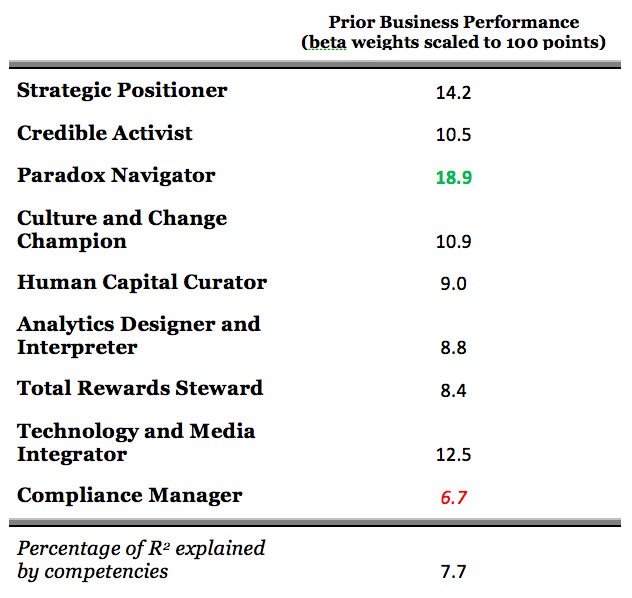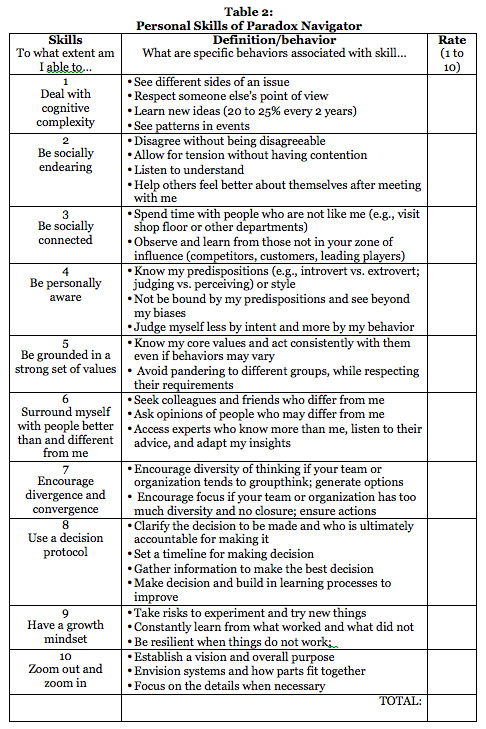Paradox Navigator: 10 Skills every HR Professional Needs to Deliver Business Results
In our research, we have found that there are 9 domains for HR competence. We are particularly interested in how these competence domains drive the outcomes of personal effectiveness, stakeholder value, and business results. We found that being a credible activist helps HR professionals have personal impact; being a strategic positioner helps build value for customers and investors. Now, we want to report what HR professionals should know and do to deliver business results.
(Note: This article is drawn from the book Victory Through Organization by Dave Ulrich, David Kryscynski, Michael Ulrich, Wayne Brockbank.)

Paradox Navigator: 10 Skills every HR Professional Needs to Deliver Business Results

In our research, we have found that there are 9 domains for HR competence. We are particularly interested in how these competence domains drive the outcomes of personal effectiveness, stakeholder value, and business results. We found that being a credible activist helps HR professionals have personal impact; being a strategic positioner helps build value for customers and investors. Now, we want to report what HR professionals should know and do to deliver business results.
Through partnering with 22 global HR associations, we collected data from 32,000 respondents in 1200 businesses. We measured business results with a six item scale (profitability, labor productivity, development of new products, customer satisfaction, attraction of new employees, regulatory compliance). We wanted to see which of the nine HR competence domains had the most impact on business performance.
These results are reported in Table 1. Several interesting findings emerge. First, the paradox navigator competency seems to have the strongest relationship with business performance. This is a fascinating and new finding. Our explanation is that given the dramatic contextual changes in the business world, organizations have to change to survive. To create agile organizations requires navigating paradox which encourages “and/also” thinking. When organizations have single solutions to problems, they do not fully address how to change. Paradox enables dialogue, debate, and seeing alternatives necessary for change. Paradox means that organizations should be top down and bottom up; focused on customers outside and employees inside; being divergent and convergent; and encouraging freedom and control. Navigating these tensions enables dialogue that encourages organization agility.

(Want to know which competencies you have acquired? Take the HRCS Competency 360 assessment now.)
What does it mean to be a paradox navigator?
As shown in Table 1, staff leaders in HR who navigate paradox had the biggest impact on business results. Paradoxes exist when seemingly contradictory activities operate together. We experience paradoxes in daily life as captured by the popular phrases: tough love, do more with less, oil and vinegar, sweet and sour, work/life balance, Catch 22, go slow to go fast, good and evil, and so forth. When these inherent contradictions work together, success follows. Instead of focusing on either/or; paradoxes emphasize and/also thinking.
Organizations and leaders who respond to the disruptions above do so by navigating paradox. Navigating paradox accepts and heightens disagreements that enable organizations to change and evolve. Without the tensions that come from paradoxical thinking and debates, organizations perpetuate the status quo and do not respond to change. Leaders of these organizations need to become paradox navigators to help their organizations respond to the pace of change.
Navigating paradox accepts and heightens disagreements that enable organizations to change and evolve.
HR professionals who are paradox navigators encourage, surface, and raise difficult issues so that they can be resolved. For example, we have found that there are times when a business team should diverge and other times when they should converge. Divergence means that alternatives are explored. When an HR professional is in a meeting where there are few options discussed, the HR professional should encourage divergence where new alternatives are discussed. On the other extreme, when a group remains divergent, the HR professional needs to create convergence and unity to focus attention. We found in our work that as Paradox Navigators, HR professionals may not be the most popular members of a business team because they raise difficult, but necessary issues. But, their ability to navigate paradox is the most important skill for business results.
How to improve skills to be a paradox navigator
Paradox navigation is not an innate trait, but a learned set of behaviors that translate into skills. Based on our research and experience, leaders who are Paradox Navigators possess the knowledge, skills, and abilities proposed in Table 2. When HR professionals recognize, assess themselves, and master these skills, they are more able to drive business success.

HR professionals and business leaders can acquire and improve these paradox navigation skills through extensive training, development, and coaching. But, perhaps the most important prerequisite is to recognize the importance of navigate paradox in delivering business results. HR professionals who want to deliver real business value must become paradox navigators.
To learn more about our study and how you can acquire the competencies you lack, download the first chapter of my book Victory Through Organization for free by clicking here.


